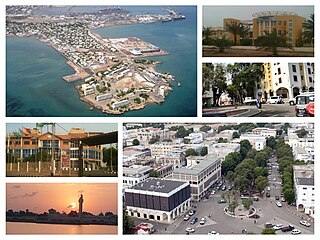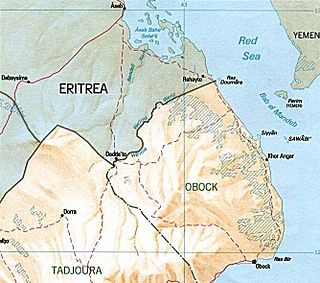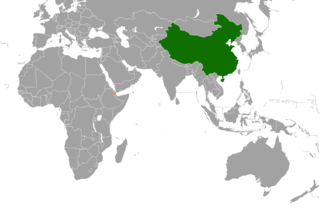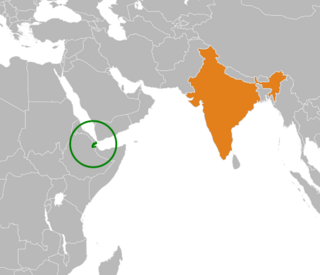Twenty-first century
Years in Africa | |
|---|---|
| Sovereign states |
|
States with limited recognition | |
Dependencies and other territories |
|
This is a timeline of History of Djibouti . Each article deals with events in Djibouti in a given year.

Djibouti is a country in the Horn of Africa. It is bordered by Eritrea in the north, Ethiopia in the west and south, and Somalia in the southeast. To the east is its coastline on the Red Sea and the Gulf of Aden. Rainfall is sparse, and most of the territory has a semi-arid to arid environment. Lake Assal is a saline lake which lies 155 m (509 ft) below sea level, making it the lowest point on land in Africa and the third-lowest point on Earth after the Sea of Galilee and the Dead Sea. Djibouti has the fifth smallest population in Africa. Djibouti's major settlements include the capital Djibouti City, the port towns of Tadjoura and Obock, and the southern cities of Ali Sabieh and Dikhil. It is the forty-six country by area in Africa and 147st largest country in the world by land area, covering a total of 23,200 km2 (9,000 sq mi), of which 23,180 km2 (8,950 sq mi) is land and 20 km2 (7.7 sq mi) is water.

The economy of Djibouti is derived in large part from its strategic location on the Red Sea. Djibouti is mostly barren, with little development in the agricultural and industrial sectors. The country has a harsh climate, a largely unskilled labour force, and limited natural resources. The country's most important economic asset is its strategic location, connecting the Red Sea and the Gulf of Aden. As such, Djibouti's economy is commanded by the services sector, providing services as both a transit port for the region and as an international transshipment and refueling centre.

Ismaïl Omar Guellé is the current President of Djibouti. He has been in office since 1999, making him one of the longest-serving rulers in Africa. He is often referred to by his initials, IOG.

The culture of the Republic of Djibouti is diverse, due to the nation's Red Sea location at a crossroads of trade and commerce.

Djibouti is the capital of Djibouti. It is located in the coastal Djibouti Region on the Gulf of Tadjoura.

The Djibouti national football team, nicknamed the Riverains de la Mer Rouge, is the national football team of Djibouti. It is controlled by the Djiboutian Football Federation and is a member of the Confederation of African Football (CAF) and the Union of Arab Football Associations (UAFA). The Djibouti national football team's first win in a full FIFA-sanctioned international match was a 1–0 win vs. Somalia in the first round of the 2010 FIFA World Cup qualification.

National-level elections in Djibouti are held for the President and the unicameral National Assembly.

The Catholic Church in Djibouti is part of the worldwide Catholic Church, under the spiritual leadership of the Pope in Rome.

Djibouti has participated in nine Summer Olympic Games as of the completion of the 2020 Summer Olympics in Tokyo. They have never competed in the Winter Olympic Games. Djibouti debuted at the 1984 Summer Olympics in Los Angeles, United States of America with three athletes, but did not take home a medal. The highest number of Djiboutian athletes participating in a summer Games is eight in the 1992 games in Barcelona, Spain. Only one Djiboutian athlete has ever won a medal at the Olympics, marathon runner Hussein Ahmed Salah, who won a bronze medal in the 1988 marathon.

Djibouti – United States relations are bilateral relations between Djibouti and the United States.

Djibouti, officially the Republic of Djibouti, is a country in the Horn of Africa, bordered by Somalia to the south, Ethiopia to the southwest, Eritrea in the north, and the Red Sea and the Gulf of Aden to the east. The country has an area of 23,200 km2 (8,958 sq mi).

The Djiboutian–Eritrean border conflict between the forces of Djibouti and Eritrea occurred between June 10 and June 13, 2008. It was triggered by tension which began on April 16, 2008, when Djibouti reported that Eritrean armed forces had penetrated into Djibouti and dug trenches on both sides of the border. The crisis deepened when armed clashes broke out between the two armed forces in the border area on June 10, 2008. During the conflict, France provided logistical, medical and intelligence support to Djibouti, but did not participate in direct combat.

People's Republic of China–Djibouti relations refers to the current and historical relationship between the People's Republic of China and Djibouti. China and Djibouti established relations on January 8, 1979. China has financed a number of public works projects in Djibouti, including a stadium, the offices of the Ministry of Foreign Affairs and the People's Palace. In September 2010, Type 920 Hospital Ship, also known as the "Peace Ark", visited Djibouti.

All visitors to Djibouti must obtain either a visa on arrival to Djibouti, an electronic visa online or a visa from one of the Djiboutian diplomatic missions prior to arrival in Djibouti, unless they come from one of the visa exempt countries mentioned below.

Djibouti–India relations are bilateral relations between Djibouti and India. Djibouti has an embassy in New Delhi and a Consulate-General in Mumbai. India has an embassy in Djibouti City.
The COVID-19 pandemic in Djibouti was a part of the worldwide pandemic of coronavirus disease 2019 caused by severe acute respiratory syndrome coronavirus 2. The virus spread to Djibouti in March 2020. It is a novel infectious disease caused by severe acute respiratory syndrome coronavirus 2. Model-based simulations for Djibouti indicate that the 95% confidence interval for the time-varying reproduction number R t has been rising since August 2020 and exceeded 1.0 until April 2021.

Djibouti–Turkey relations are the bilateral relations between Djibouti and Turkey. Currently, Turkey has an embassy in Djibouti since 2013, while Djibouti has an embassy in Ankara since 2012.